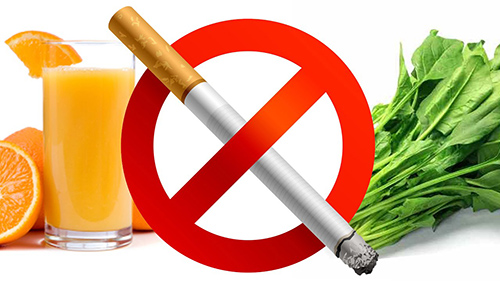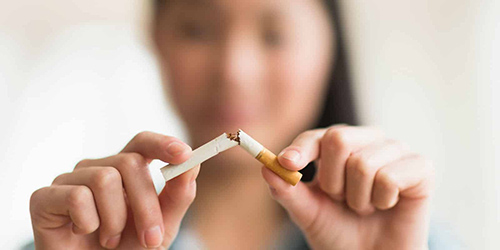Contents
Nicotine is the chemical in tobacco that stimulates the brain’s reward areas and gives the smoker a high. Thankfully, there are healthy foods to help quit smoking.

Remove Nicotine From the Body
Their severity is generally related to the degree of smoking, with heavy smokers suffering more intensely. As expressed by many ex-smokers, the symptoms gradually subside, and the betterment of health is beyond belief.
Eating the right foods to help quit smoking plays an essential role in kicking the habit. When quitting smoking, one must carefully choose foods that help with cigarette cravings. These foods must achieve these three goals:
- Remove nicotine and other poisons from the body: Water fruits and vegetables with depurant qualities contribute to this.
- Repair the damage: Plant-based foods rich in antioxidants protect the cells from tobacco’s chemical aggression and contribute to restoring the damage already done.
- Reduce the desire to smoke: Avoid foods that do not kill nicotine cravings.
Foods to Help Quit Smoking
WATER: Abundant water consumption facilitates the elimination of nicotine and other toxins in the smoker’s body through the urine.

FRUIT: Fruit provides antioxidant vitamins and phytochemicals that neutralize part of the poisons in tobacco. They also facilitate the body’s general detoxification, increasing urine production and eliminating waste products and toxins.
VEGETABLES: Vegetables are rich in detoxifying and depurant minerals and vitamins. Those with vivid colors are rich in carotene, which protects the bronchial mucosa cells, making them amongst the best foods to help quit smoking. Garlic, onions, radishes, and others rich in sulfurated essences reduce the desire to smoke and are among the best foods to help quit smoking.

VITAMIN C: This vitamin is among the best foods for smokers because it is the leading natural antidote to tobacco’s nicotine and tars. Its function is to neutralize the free radicals and other poisons in tobacco; thus, smokers require 50% more vitamin C than nonsmokers. Smoking cessation treatment requires large amounts of vitamin C in the form of fruits and vegetables or supplements.
WHEAT GERM: Wheat germ is rich in the B vitamins and minerals necessary for the nervous system’s proper function and to overcome the stress of giving up tobacco. Wheat germ is one of the best foods to help quit smoking.
ANTIOXIDANTS: Antioxidants neutralize the cellular damage produced by the toxins in tobacco, making them an excellent food for smokers’ lungs. Provitamins A (beta-carotene), vitamins C and E, and flavonoids are among the most effective and are found primarily in fruits and vegetables.
Foods to Avoid
ALCOHOLIC BEVERAGES: Drinking alcoholic beverages increases the desire to smoke and reduces the willpower needed to stop smoking.
STIMULANT BEVERAGES: The caffeine in coffee, tea, and mate is an alkaloid with complementary effects to nicotine. Because of this, coffee increases the desire for tobacco and vice versa.
SATURATED FAT: Saturated fat increases cholesterol levels and deteriorates the arteries. Thus, it is harmful to smokers since their arteries are usually already suffering from nicotine use, which is also a cause of arteriosclerosis.
MEAT: Meat also contains a stimulant to the central nervous system, similar to caffeine, increasing the craving for smoke.
SPICES: Strong flavors intensify the need to smoke and should be avoided when attempting to quit smoking.
DISCLAIMER: All content on this website is presented solely for educational and informational objectives. You should not rely on the information provided as a replacement for advice, diagnosis, or treatment from a qualified medical expert. If you are pregnant, nursing, or have any preexisting medical concerns, you should talk to your doctor before using any herbal or natural medicines.
REFERENCES
- George D. Pamplona-Roger, M.D. “Encyclopedia of Foods and Their Healing Power.” George D. Pamplona-Roger, M.D. Encyclopedia of Foods and Their Healing Power. Trans. Annette Melgosa. Vol. 2. Chai Wan: Editorial Safeliz, 2005. 141. Print.
- Hardinge, Mervyn G., and Harold Shryock. “Family Medical Guide.” Hardinge, Mervyn G., and Harold Shryock. Family Medical Guide. Ed. Marvin Moore and Bonnie Tyson-Flynn. Vol. one. Oshawa; Washington, D.C.; Hagerstown: Pacific Press Publishing Association; Review and Herald Publishing Association, 1999. Three vols. 376, 377. Print.
- CDC – Tips From Former Smokers: A comprehensive guide from the CDC with practical tips, stories from former smokers, and various tools to assist in quitting smoking.
